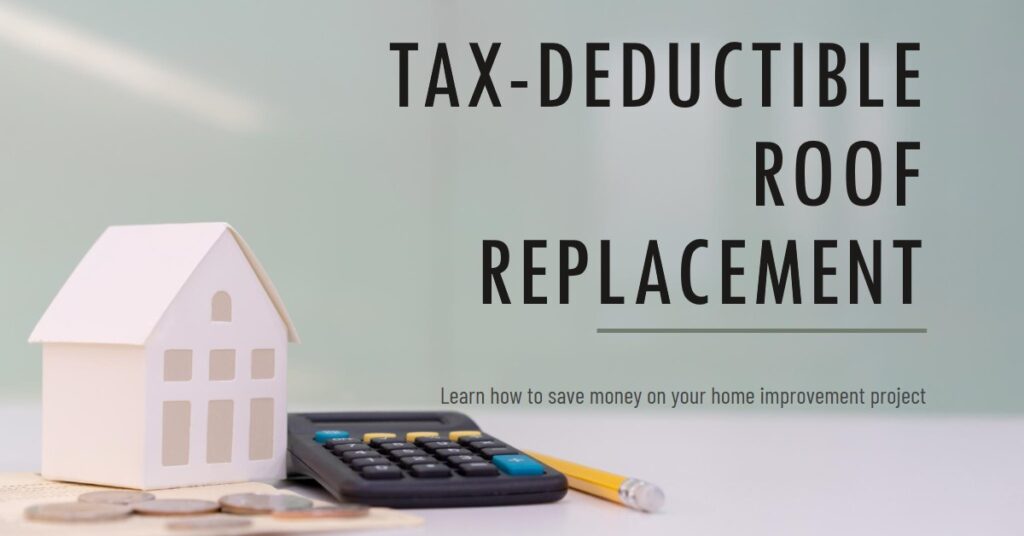Is your roof replacement tax-deductible? Most homeowners can’t deduct it right away, but it can increase your home’s tax value. When you sell your home, a higher basis can reduce the taxable amount of your sale price.

For example, if you bought your home for $200,000 and spent $10,000 on a roof replacement, your basis would be $210,000.
If you later sell your home for $250,000, only $40,000 would be subject to taxes rather than $50,000.
Roof replacements can be a significant investment for homeowners. As with any large home improvement project, it’s natural to wonder if any tax benefits are associated with the cost.
Specifically, is your roof replacement tax-deductible? Let’s explore this topic in detail.
Understanding Home Improvement Tax Deductions
Before diving into the specifics of roof replacements, it’s essential to have a general understanding of how home improvement tax deductions work.
What Constitutes a Home Improvement?
The IRS defines a home improvement as any project that “adds to the value of your home, prolongs its useful life, or adapts it to new uses.”
These can range from building an addition to upgrading your heating and cooling systems. Roof replacements typically fall into the category of prolonging your home’s useful life.
Home Repairs vs. Home Improvements
It’s crucial to differentiate between home repairs and home improvements. Repairs maintain your home’s current value, such as fixing a leak or replacing a broken window.
On the other hand, improvements increase its value, extend its life, or adapt it to new uses.
The distinction is essential because, for tax purposes, repairs are not typically deductible, while improvements can be under specific circumstances.
Roof Replacements and Tax Deductions
Now, let’s delve into the heart of the matter: the tax implications of a roof replacement.
Is a Roof Replacement Tax-Deductible?
Most homeowners must immediately wait to deduct the roof replacement cost from their taxes.
However, the expense can add to the “basis” of your home, which is the value of your property for tax purposes.
When you sell your home, a higher basis can reduce the taxable amount of your sale price.
Exceptional Circumstances: Tax Credits for Energy Efficiency
There are specific scenarios where homeowners might benefit from tax credits related to their roof replacement.
You might be eligible for a tax credit if you install a metal roof with pigmented coatings or asphalt roofs with cooling granules that meet the Energy Star requirements.
This is part of the government’s initiative to encourage energy-efficient home improvements.
However, it’s essential to note that tax credits and deductions are different. A tax credit reduces the tax you owe, while a deduction reduces your taxable income. Always check current tax laws or consult a tax professional to determine the current status of energy-efficient tax credits.
Tax Considerations for Roof Replacements in Rental Properties
If you’re a landlord and replace the roof on your rental property, the dynamics change slightly. In this case, you can’t deduct the entire roof replacement cost in a single tax year.
Instead, you would depreciate the cost over the asset’s useful life, which, for a roof, is typically 27.5 years for residential property.
Business Use of Home
For those who use a portion of their home exclusively for business, such as a home office, there might be some tax advantages when replacing the roof.
The IRS allows for the deduction of expenses related to the business use of your home, which could include a portion of the roof replacement cost.
However, the rules are complex, and it’s essential to ensure you meet all the requirements.
Insurance Claims and Roof Replacements
If you’ve replaced your roof due to damage and received an insurance payout, it’s essential to understand the tax implications. Generally, insurance payouts aren’t taxable.
However, if you claim a casualty loss deduction (if your insurance doesn’t cover the total amount) and receive an insurance payout later, you might need to include some of that in your taxable income.
Maximizing the Tax Benefits of Your Roof Replacement
To ensure you’re making the most of potential tax benefits from your roof replacement, consider the following tips:
Keep Detailed Records
Always keep detailed records of your home improvements, including your roof replacement. This includes contracts, invoices, and any other related documentation.
These records can be crucial when selling your home or if the IRS audits you.
Consult with a Tax Professional
Tax laws can be complex and change frequently. It’s always a good idea to consult a tax professional or accountant who can provide guidance tailored to your situation.
Consider Energy-Efficient Options
If you’re replacing your roof, consider energy-efficient options that could qualify for tax credits. Not only can these reduce your tax bill, but they can also lower your energy costs in the long run.
Conclusion
In conclusion, while the roof replacement cost is not immediately tax-deductible for most homeowners, it can offer tax benefits in the long run by increasing the basis of your home.
Additionally, specific energy-efficient roofing options qualify for tax credits.
As with any significant investment or home improvement project, it’s essential to do your research and consult with professionals.
By understanding the potential tax implications and benefits of your roof replacement, you can make informed decisions that benefit your home and wallet.
